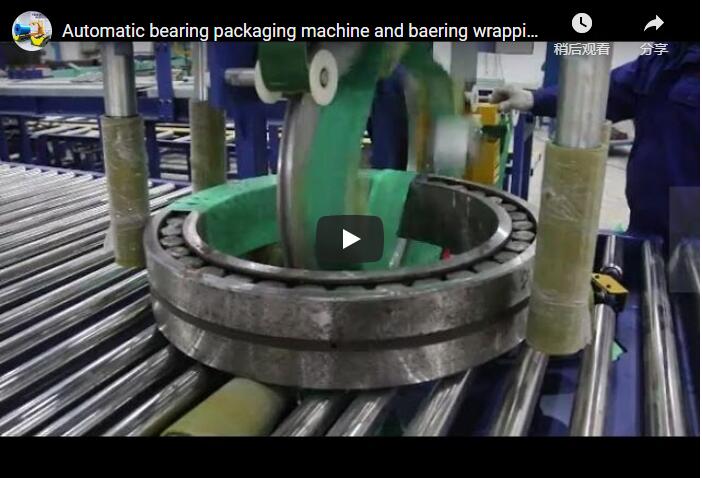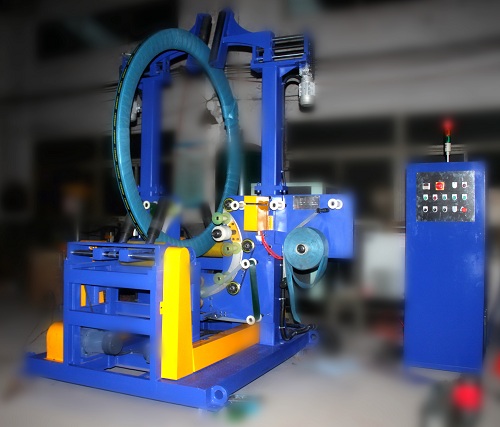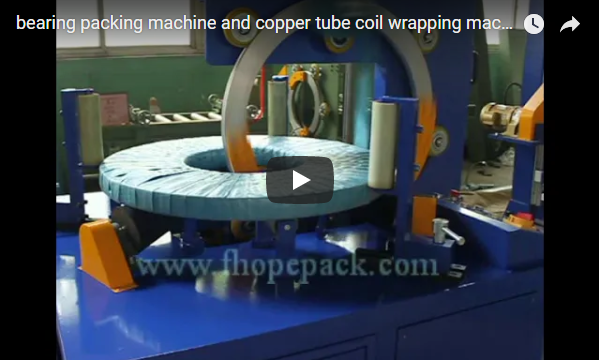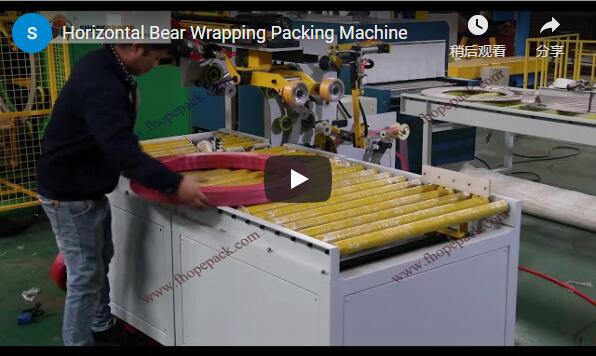Enhanced Bearing Packaging: Boosting Protection and Efficiency with Automated Wrapping Machines
In demanding manufacturing and fabrication environments, protecting precision components like bearings during handling, storage, and shipping is non-negotiable. Manual packaging methods often fall short, leading to inconsistencies, potential corrosion, and damage. This is where automated bearing wrapping machines, particularly those utilizing combined materials like VCI paper and stretch film, offer a robust solution. This article delves into the technical aspects, operational benefits, and practical considerations of implementing these essential machines, drawing on real-world observations.
1. Decoding the Technology: Bearing Wrapping Machines Explained
At its core, a bearing wrapping machine is purpose-built automation designed to securely package bearings. The most common type for this application is the orbital wrapper. This machine operates by passing a shuttle carrying the packaging material (like stretch film, VCI paper, or crepe paper) through the center bore of the bearing as the bearing itself rotates on support rollers. This creates a tight, conformal wrap around the bearing's surfaces.
- Film + Paper Combination: Many advanced machines are engineered to apply multiple layers simultaneously or sequentially. A typical high-protection strategy involves:
- An inner layer of VCI (Volatile Corrosion Inhibitor) paper: This chemically impregnated paper releases vapors that form a protective molecular layer on the metal surfaces, actively preventing rust and corrosion – critical for ferrous components.
- An outer layer of stretch film: This provides a physical barrier against dust, moisture, and contaminants, while also securing the VCI paper and adding structural integrity to the package.
- Operational Cycle: A typical cycle involves loading the bearing onto rollers, initiating the wrap cycle (where the shuttle orbits and the bearing rotates), automatic material cutting and feeding, and unloading the wrapped bearing.
2. The Imperative for Automated Bearing Packaging
The shift from manual to automated bearing packaging isn't just about speed; it's driven by critical needs for quality and consistency that manual methods struggle to meet reliably.
- Enhanced Product Protection: Inconsistent manual wrapping can leave gaps or apply insufficient tension, exposing bearings to corrosive elements (humidity, contaminants) or physical shock during transit. Automation ensures a uniform, tightly sealed wrap every time, drastically reducing the risk of damage and subsequent costly claims or rework.
- Achieving Packaging Consistency: Automated systems deliver identical packaging results unit after unit. This standardization is vital for brand perception, customer satisfaction, and meeting specific packaging specifications often required by OEMs or for military/aerospace applications.
- Overcoming Manual Limitations: Manual wrapping is labor-intensive, slow, and ergonomically challenging, especially for larger or heavier bearings. It's prone to human error and variability depending on the operator. Automation directly addresses these bottlenecks, freeing up labor for higher-value tasks.
3. Key Technical Features and Capabilities
Modern bearing wrapping machines incorporate several features designed for performance, flexibility, and ease of use:
- PLC Control with HMI: Programmable Logic Controllers (PLCs) manage the machine's functions, allowing for precise control over wrapping parameters (overlap, rotation speed, tension). Human-Machine Interfaces (HMIs), often touchscreens, provide intuitive operator control, program storage, and diagnostics.
- Adjustable Material Tension Control: Crucial for preventing damage to delicate bearings while ensuring a secure wrap. Advanced systems use electronic or pneumatic controls for precise, repeatable tension settings.
- Automatic Material Feed and Cut: Eliminates manual intervention during the wrapping cycle, boosting speed and consistency. Sensor-based systems ensure accurate material positioning and clean cuts.
- Variable Speed Controls: Allows adjustment of both ring (shuttle) speed and roller rotation speed to optimize the wrap for different bearing sizes and material types.
- Safety Features: Interlocked guarding, emergency stops, and light curtains are standard to ensure operator safety during operation.
- Versatility: Designed to handle a range of bearing Outside Diameters (OD), Inside Diameters (ID), and widths, often with quick-change tooling or adjustable rollers.
4. Tangible Benefits on the Shop Floor
Implementing an automated bearing wrapping solution translates into measurable improvements:
- Increased Throughput: Automation dramatically cuts down packaging cycle times compared to manual methods, often increasing output by multiples. A process that took minutes manually can often be completed in under a minute.
- Reduced Labor Costs: Reallocating labor from manual wrapping to other tasks provides significant long-term cost savings.
- Minimized Material Waste: Precise control over material application and overlap reduces excessive use of expensive VCI paper and stretch film.
- Improved Quality Control: Consistent, high-integrity packaging leads to fewer rejections, reduced customer complaints related to shipping damage or corrosion, and enhanced product reliability upon arrival.
- Enhanced Operator Ergonomics: Automating the wrapping process eliminates repetitive motions and awkward handling, improving workplace safety and reducing fatigue.
5. Typical Machine Specifications (Example Parameters)
When evaluating machines, consider these key technical specifications:
- Bearing OD Range: e.g., 200mm - 1500mm
- Bearing ID Range: e.g., 100mm - 1200mm
- Bearing Ring Width: e.g., 50mm - 500mm
- Max Load Capacity: e.g., up to 2000kg (depending on model)
- Wrapping Material: Stretch Film (LLDPE), VCI Paper, Crepe Paper, PE Film
- Material Roll Width: e.g., 90mm - 120mm
- Ring Speed (Wrapping Speed): e.g., 40 - 90 rpm (adjustable)
- Roller Speed (Rotation Speed): e.g., 2 - 4 m/min (adjustable)
- Overlap Rate: 10% - 90% (adjustable via PLC/HMI)
- Control System: PLC + HMI
- Power Supply: Typically 380V, 3-Phase, 50/60Hz (or customized)
(Note: These are illustrative ranges; specific machine capabilities vary widely by manufacturer and model.)
6. Integrating Technology for Smarter Packaging
Beyond basic automation, bearing wrapping systems are incorporating smarter technologies:
- Sensor Integration: Sensors monitor material levels, confirm bearing presence, detect wrapping faults, and ensure safety interlocks are active, providing real-time feedback via the HMI.
- Network Connectivity (Optional): Some advanced systems offer Ethernet connectivity, allowing integration with plant-level Manufacturing Execution Systems (MES) or Enterprise Resource Planning (ERP) systems for data logging, remote monitoring, and production tracking.
- Simplified Diagnostics: Modern HMIs often include detailed diagnostic screens, helping maintenance personnel quickly identify and troubleshoot issues, minimizing downtime.
7. Selecting the Right Bearing Wrapping Solution
Choosing the appropriate machine requires careful consideration:
- Production Volume: Match machine speed and automation level to your output requirements (semi-auto vs. fully auto).
- Bearing Size and Weight Range: Ensure the machine's physical capacity (OD, ID, width, weight) covers your product mix.
- Packaging Material Requirements: Confirm compatibility with the specific types and combinations of materials needed (VCI paper, film types, etc.).
- Level of Automation: Consider upstream and downstream integration (conveyors, labeling).
- Budget vs. ROI: Balance the initial investment against projected savings in labor, material, and damage reduction.
- Vendor Support: Evaluate manufacturer reputation, warranty, training, and parts availability.
8. Navigating Implementation Hurdles
While beneficial, adopting automation involves challenges:
- Initial Investment: The capital cost requires justification through a clear Return on Investment (ROI) analysis, factoring in labor, material savings, and quality improvements.
- Operator Training: Staff need training to operate the HMI, understand machine functions, perform basic troubleshooting, and safely load/unload bearings.
- Floor Space and Integration: Ensure sufficient space is available and plan how the machine will fit into the existing production flow, potentially requiring conveyor modifications or layout adjustments. Maintenance access is also key.
9. Real-World Impact: Observations from the Field
From personal experience and industry observation, the transition to automated bearing wrapping consistently yields positive results. Shops report:
- Drastic Reduction in Packaging Time: What was once a bottleneck becomes a smooth, predictable part of the workflow.
- Noticeable Decrease in Shipping Issues: Fewer calls about rusted or damaged bearings upon arrival directly impacts the bottom line and customer relationships.
- Improved Shop Floor Organization: Automated systems often have a smaller footprint than sprawling manual packing stations and contribute to a cleaner, more organized workspace.
- Enhanced Brand Perception: Professionally wrapped bearings project an image of quality and care that customers notice.
10. The Future Trajectory of Bearing Packaging Automation
The technology continues to evolve:
- Sustainable Materials: Development and integration of biodegradable or recyclable VCI films and papers are growing priorities. Explore options with suppliers like Cortec Corporation (Example credible external link for VCI info).
- Robotics Integration: Using robots for loading/unloading bearings onto the wrapper, especially for heavy components, further enhances automation and safety.
- Data Analytics: Leveraging machine data for predictive maintenance alerts (e.g., anticipating roller wear) and optimizing wrapping parameters based on real-time conditions.
- Greater Customization: Machines offering even faster changeovers and wider adaptability for varying bearing geometries and packaging requirements.
By embracing automated bearing wrapping machines using combined materials like film and VCI paper, manufacturers can significantly upgrade their packaging processes, ensuring superior product protection, operational efficiency, and a stronger competitive edge.






